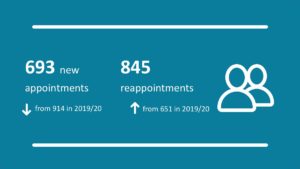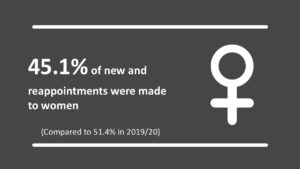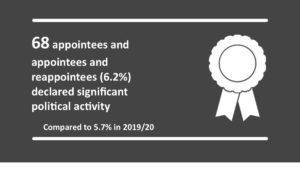Unfinished Business – OCPA Annual Report 2020-21
Thursday 23 September 2021
As I finally step down as Commissioner for Public Appointments at the end of September after nearly five and a half years, my feelings are mixed. There are strong positives – the commitment of thousands of people who serve on the boards of arms-length bodies which serve the public, often for little or no pay, and the determination of officials in Whitehall departments to ensure that the system of appointment is fair and open. But there are also question marks. The system can be slow and can appear, and be, too often arbitrary to those involved. And the strong progress on diversity of appointments in recent years has gone into reverse this year, perhaps temporarily.

In particular, as my final annual report for 2020-21 shows, the Covid pandemic has had a big impact, not least coming after a period of political turbulence in 2019. Whitehall departments coped well, quickly and efficiently moving to remote interviewing. But, perhaps inevitably, there have been delays with more requests from departments to extend people in post or to make short-term appointments. Moreover, the number of reappointments rose compared with the previous year, as it was easier to reappoint board members than to hold fresh competitions.
Of more concern, however, has been the decline in the number of new appointments and reappointments to women – from over 50 per cent to around 45 per cent – and to those from ethnic minorities – from 15 per cent to less than 10 percent. In some cases, the origin for the decline appears to be from fewer people making applications in the first place, but in others, there is uneven progress through each stage of a competition. The figures for those declaring disabilities are much harder to interpret because of changes in the way the data are compiled. I am reluctant to exaggerate the significance of these declines in view of the impact of the pandemic – and the figures still remain higher than in the private and voluntary sectors. But departments clearly need to keep a close eye on these trends and take action where the evidence shows gains can be made.

Diversity is not just a tick box aspect of my role – it is really about broadening opportunity to ensure that the boards of public bodies are representative of the public they serve, rather than being dominated by professional men near or at retirement age. Boards benefit from diversity. Much progress has been made but it is vital that – post-Covid – departments revive their outreach programmes to attract a wider range of candidates from under-represented groups. This is about widening social and geographic representation as well as gender, race and disability.
One problem, highlighted by a thorough thematic review by my office, is the inconsistency in the levels of remuneration for public appointments – often with little apparent correlation with the amount of time required for a post. Many, especially local justice, roles are unpaid. This is not about the pay of chairs of public bodies but is about encouraging applications from those with caring responsibilities, the self-employed or those living far from London. While the official response was bland and non-committal, I am encouraged by greater interest from departments which, in practice, determine pay levels.
Most political and media attention on public appointments is devoted to the alleged ‘politicisation’ of high profile appointments. Much of this comment is muddled since the process has always been political in the sense that ministers are closely involved in the selection of candidates. And as the annual report shows, fewer than 7 per cent of those appointed and reappointed (that’s less than 70 people from over 1,500) have declared significant political activity – though the media focus tends to be more on higher profile appointments – usually chairs of public bodies.

The question is the balance within the system of open competition by merit assessed by advisory interview panels including an independent element. My role as Commissioner is to oversee that balance. It is not to have a view on the choice of appointees by ministers, but to regulate the process by which applicants are assessed as appointable. In general this works reasonably well but there have been increasing tensions as some ministers and advisers have sought to have their allies appointed. There have been questions over attempts to brief about favoured candidates ahead of competitions and to push the limits of the Governance Code in the composition of interview panels. A crucial part of my role is to challenge these attempts internally – and where necessary externally.
A related issue is the apparently growing number of unregulated appointments by ministers. In many cases it is reasonable that short-term roles such as the heads of task forces (for instance connected with the handling of Covid) or reviews do not come within the remit of the Commissioner. But there are grey areas such as non-executive members of the boards of Whitehall departments. Above all, there is a need for transparency so we know who is appointed, and whether the roles are currently regulated or unregulated.
For all the frustrations – often between public bodies and their sponsoring ministers – and the delays in making appointments and reappointments, I believe service on arms-length bodies is worthwhile and continues to attract high quality people committed to public service. I believe the independent Commissioner’s role is critical to providing wider public assurance about how appointments are made. I would like to thank my team in OCPA and to wish William Shawcross, my successor, all best wishes for his service in a fascinating role.

